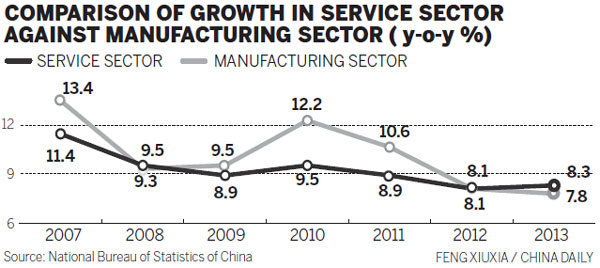Among the experts, believe whom you will because few agree
By Ed Zhang (China Daily) Updated: 2014-01-27 08:14
The outlook for China's growth this year depends very much on which expert you talk to. The range of forecasts is huge, from a dismal 6 percent or so for GDP growth to bullish figures depicting expansion not seen since the late 1990s.
People care about China's growth because the country's performance will affect the prices of many commodities and services worldwide - and ultimately affect many businesses. But the country is also so complex that even many Chinese economists cannot agree with one another in overall terms.
Some analysts tend to emphasize the problems and the dangers those problems purportedly pose. And the problems are many - from hideous corruption and rampant rule-bending in some areas to a lack of basic rules in others. If all the icebergs appeared at once and were as large and menacing as they are supposed to be, you would think few countries would remain afloat once there was contact.
Other analysts tend to say: "Well, we've seen many of these problems - from the government's mounting debt, mainly at the local level, to the piling up of non-performing bank loans.
"We've seen worse job market crises. We saw millions of people without jobs, feeling bitter about their lives in many cities - first the young people freed from rural re-education camps in the early 1980s, then middle-aged workers (reportedly as many as 30 million) made redundant by the reform of State-owned enterprises the then premier Zhu Rongji conducted.
"We've seen areas full of abandoned building projects in our cities. And you can still see their remnants in cities such as Haikou in Hainan and Beihai in Guangxi Zhuang autonomous region."
Admittedly, many of the troubles that China has gone through also involved huge social costs, such as inflation when State control of all prices was lifted in the late 1980s.
But the experience in handling the results of reform, and especially in steering the economy back to normal growth again, has toughened the country in ways that other countries have not experienced so intensely.
The huge diversity in all the China forecasts this year (as in every year, short-term or long-term) reflects the poles of a range of possibilities: either the country has learned nothing from its experience or it has learned so much that it no longer needs to keep learning.
Either of those is an unlikely outcome, going by how much debate there is in the Chinese media about what to do to implement the changes that people are calling for.
No matter how much growth slows, it is a slowdown that the government is engineering. Macroeconomic authorities cannot let things run out of control as in the early 1990s, when many still had doubts about the market orientation of reforms following the debacle of the initial price reforms, when the economy showed 5 percent growth in 1990 and 7 percent in 1991.
The result was plain to all. Problems from a slowdown of that kind forced the country to implement market-oriented reforms on a much larger scale - and much more earnestly.
In fact, the next waypoint for reform is apparent in the National Bureau of Statistics' preliminary report for last year. For the first time in the country's recent history, growth in services, 8.3 percent, exceeded that of manufacturing, 7.8 percent, in a meaningful way.
This has not come easily. Growth in the two sectors was on a par, 8.1 percent, in 2012. In 2011, manufacturing growth outstripped services growth, 10.6 percent to 8.9 percent and, in 2010, manufacturing grew 12.2 percent and services 9.5 percent.
The only other time the service sector grew slightly faster was in 2008 after the global financial crisis ruined many of China's export opportunities.
Despite the many uncertainties that change may bring, if China can manage to keep its service sector expanding faster than manufacturing, it is highly likely to grow into a more consumption-based economy.
Believe whichever expert you will on growth, but bear one thing in mind: In gauging China's performance over the next few years, the service-manufacturing comparison is going to be a more useful gauge of performance than GDP growth.
The author is editor-at-large of China Daily.
- Service sector outperforms industry for first time
- Service sector growth slows
- China's service sector may exceed manufacturing
- Service sector sees seasonal softening
- Startups targeting consumer goods, service sectors
- China's business service sector boosts economy
- China targets 8-trillion-yuan health service sector
- Service-sector expansion slows
- NHTSA says finds no 'defect trend' in Tesla Model S sedans
- WTO rare earth ruling is unfair
- Amway says 2014 China sales may grow 8%
- President Xi in Europe: Forging deals, boosting business
- CNOOC releases 2013 sustainability report
- Local production by Chery Jaguar Land Rover this year
- Car lovers test their need for speed in BMW Mission 3
- China stocks close mixed Monday

















